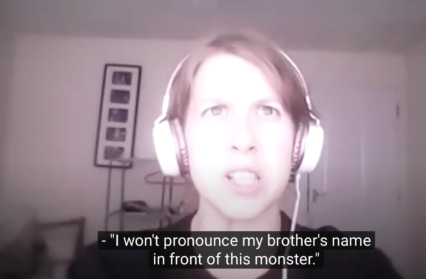Georgia Winstone reviews Hijinx’s COVID-inspired adaptation of Franz Kafka’s Metamorphosis.
Throughout lockdown, a sentiment regularly echoed across social media was that the last thing anyone needed was theatre exploring these dark and difficult times, especially as people continue to live through them. Hijinx’s COVID-era reimagining of Franz Kafka’s Metamorphosis, however, manages to capture the strangeness and falsely cheery “can do” attitudes of Zoom calls and at-home festivals exceedingly well. Metamorphosis is an apt choice of work to use as a foundation for exploring lockdown as society was, as Gregor is in the original, suddenly transformed and all seemingly awoken into a new world in which they could no longer move freely and felt trapped and restricted by new living conditions.
When lockdown was first announced, it was often stated that those who were not working throughout should emerge having developed new creative passions, learned a new language, or even started a business. Whilst some took to creativity and developing new hobbies, for very few was lockdown a period during which they could take time to pause with the hope of emerging renewed and refreshed with a new lease on life, like a butterfly emerging from a cocoon. As lockdown now eases and people begin to emerge from a collective trauma, society is more akin to a dozy and befuddled bear scrambling out of hibernation and Hijinx’s Metamorphosis presents a show in which the pandemic and resulting lockdown have been neither an opportunity for self-improvement nor an utterly despairing time, but instead a weird and newly restrictive period which people are simply trying to live through.
Hijinx’s Metamorphosis is a production depicting a production of a play which also shows snippets of said play. An awkwardly cheery Greenman Festival bartender introduces the production and appears intermittently to interact with the audience in an attempt to create a kind of festival atmosphere. The production acknowledges and presents well the awkward and at times cringeworthy false joviality expected of digital audiences. Since lockdown began, many festivals have had successful digital events yet, try as they might, it can never be taken away from the audience that they are not in fact standing in a field, pint in hand, revelling in the outside of reality feel of a festival, but are instead sat watching through a screen from their sofa, kitchen table, or their bed. Hijinx deftly mocks attempts by festivals to create a realistic experience in a digital space, but does so in a way which acknowledges the difficulties and generous work by those who have provided some form of entertainment and normality, all done in a clever meta self-analysis as the production is itself part of the Green Man Festival’s Field of Streams event.
The play regularly depicts the awkward difficulties of Zoom. With on-the-nose jokes about being unwittingly muted or not wearing trousers when still within shot of the camera, the production is not simply presenting these already tired and old-fashioned tropes, but rather acknowledging their new place in popular culture and everyday conversation. These stale ideas are juxtaposed with new, innovative and often eerie inclusions of other “Zoom humour” such as moments in which the webinar screen seems to be telling only the audience that “Kafka is talking…” and includes messages from a cast member seemingly trapped within the Zoom call itself or perhaps elsewhere. The jokes also act as cultural touchstones as they allow the audience to feel as though they are in on the joke and understand the narrative before the production cuts to a new scene or to a flashback, seemingly either to move on or restart the play. Despite the regular moments which appear deeply disturbing, especially those directly depicting events from the original text, the play is exceedingly funny. Yet it is due to the play’s well timed cuts and transitions that as soon as one begins to laugh, they are confronted with a disturbing or mundane image. The platform of the Zoom webinar provides an even greater sense of unease in the audience as, with no fellow viewers to guide them, they cannot know if everyone else is laughing along with them or if they are equally disturbed.
Many companies and organisations have taken to using Zoom as simply a platform to broadcast a play; however, Hijinx have gone further and utilised a Zoom webinar in a genuinely innovative way. The webinar in which the audience itself watches the play is woven into Zoom meetings, auditions and rehearsals, as well as an actual depiction of the original text. When producing anything intentionally meta, there is a fine line between being cleverly layered and self-aware and pretension. Hijinx’s Metamorphosis succeeds in the former. Whilst the audience does regularly have to rush to keep up with the fast-changing scenes and transitions between the present day and flashbacks, they always manage to do so and are never left behind. The production strikes a balance where it neither confuses the audience to such an extent that it is no longer enjoyable, but nor does it hold and guide so closely that it patronises. The plot is clever and complicated whilst still remaining entertaining and joyfully self-aware.
Whilst creating this production must have been a difficult feat, it never appears to be trying too hard to be clever and innovative; it simply is. It is fresh and enjoyably mind-bending, thought provoking and often a laugh-out-loud comic absurdity.
Georgia Winstone is a regular contributor to Wales Arts Review.



 Enjoyed this article? Support our writers directly by buying them a coffee and clicking this link.
Enjoyed this article? Support our writers directly by buying them a coffee and clicking this link.








